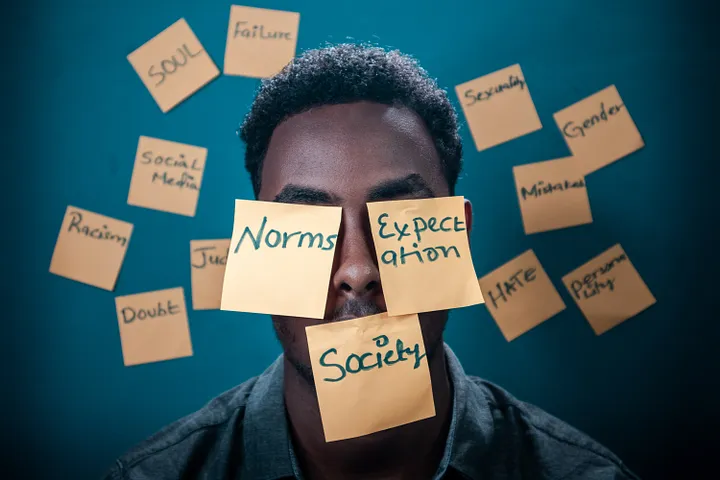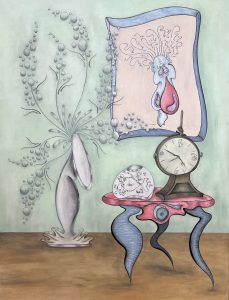Distorted Thinking – Cognitive Biases
You don’t think as well as you think you think.
LOL. Read that again. Take an aspirin.
Let’s restate that: you are a flawed monkey struggling to figure out your world.
As am I.
Welcome, again, to THINK, our regular column focusing on critical thinking so you can think clearly, make better and effective decisions, and resolve conflicts respectfully and quickly.
In April I introduced you to cognitive biases — and I promised, this month I would give you some insight to why we fall prey to cloudy and illogical thinking.
The reason is our tendency towards cognitive distortions.
COGNITIVE DISTORTIONS
Cognitive distortions are exaggerated or irrational thought patterns which perpetuate psychological states — especially depression and anxiety.
Cognitive distortions are program patterns in the mind that lead a person to use emotional reasoning — or no reasoning at all. Consider it a glitch in programming: When faced with options or choices or decisions, the person suffering from cognitive distortion has an automatic response.
This sounds similar to cognitive biases — and it is. But where cognitive biasesresult from our evolution and development of heuristics — or quick thinking patterns — cognitive distortions result from trauma in this life. Cognitivedistortions do not cause us to rely on biases, but cognitive distortions will lead us to lean towards biased thinking.
No matter our psychological diagnosis or lack thereof, we all fall prey to this distorted thinking and distorted perception of reality. These distortions affect our decision-making ability (critical thinking) because we struggle to gather evidence or facts because what we perceive filters through, we might say, a dirty lens. We cannot see reasons or logic because the distortion programming prevents it. Or, we actually consider the distortion as supporting the reasoning.
IN PRACTICE
What if I gave you the problem: 2 + 2 = 4. Easily understood. Now, if I give you the problem: 2 + 2 = X, you can give X as 4. Easy, right? But what if, no matter the rules of mathematics, you believe X is always 7. You would be consistently incorrect — and until someone shows you that X can only be 4 in that problem, you will struggle with the response.
Cognitive distortions are like that miscalculation: No matter the facts or information or logic, the person distorts the information and the resulting decision. Cognitive distortions are automatic calculations or irrational thoughts that cloud decision-making and behavior. To the person experiencing the distortion, the answer must be 7. Is always 7.
HOW DO WE DEVELOP THESE DISTORTIONS?
How does a person develop cognitive distortions? Well… being born! Not exactly that simple, but being human sentences you to being open to cognitive distortion. Typically, experiences or even one experience, results in the solidifying of a general belief. The belief may have been true in one instance or not at all, but it was helpful to your survival. It then becomes a truism: something the person relies upon as a fact. As beliefs — what we consider fact — are the bedrock of values, attitudes, and behavior, the incorrect and automatic calculation is dangerous indeed.
Here’s an example:
Carla’s parents fought all the time as she was growing up. Her father consistently insisted he was right and would not allow any dissension. Everyone seemed to fear and respect her father, including her mother. The always being right person is feared, respected — and loved. As Carla gets older, she adopts this approach with people: She is always right and knows that is the way to be respected. To be an intimidating leader. To be loved.
Notice the negative reasoning resulting from cognitive distortions:
- Wanda has very low self-esteem and knows others hate her. When her coworker, Sam, questions her decision on a recent work project, she reacts emotionally and quits her job.
- Human resource manager Zane knows other races are inferior to his own. When a person of another race applies for a job, Zane throws away the resume.
- Penny votes for her chosen candidate because her father told her to do so. And she does what her father says because she knows he’s right.
- Josh is not worried about court in the morning — he knows he will be found innocent because he saw signs in his coffee cup.
THE DISTORTIONS LIST
Let’s break these down. The name of the distortion is in bold. Give this a quick read during lunch- but a considered read when you have time to digest each example.
Also called fear of being wrong, self-defensiveness, and face-saving, always being right is a persistent protest to prove one’s actions or thoughts as correct or superior. The person acts as if he or she is continually being interrogated and he or she often reacts angrily or even violently to receive validation.
Blaming occurs when an individual holds others responsible for the harm the individual has caused. Related to scapegoating, psychological projection, and selecting a fall guy, blaming is the core of many destructive conflicts and every marital or sibling conflict. Its opposite is personalization, holding oneself responsible for things outside of one’s control. Consider the child who thinks it’s her fault mom and dad are getting a divorce?
Both blaming and personalization are versions of the distortion, the fallacy of control. The fallacy of control results from two extremes: One person thinks his or her life is controlled by others or circumstances; one person thinks he or she has all the control and takes all the blame. I’ll talk about this in my article The We Won Crowd (to appear here on July 15th). Typically, that person’s success is his or her doing, but failure is someone else’s fault. If the person has very low self-esteem, the opposite affect is assumed (bad things are his or her fault; good things are blessing from outside).
Dichotomous reasoning (known by many names: polarizing, black-and-white reasoning, all-or-nothing thinking, either-or thinking) is the failure of a person to recognize the many positive and negative elements in a range of choices.It’s yes or no, bad or good, up or down — there is no grey area or middle ground. We experience this in many ways: You must go to college or be a failure all your life. You must get married or no one loves you.
A person who uses the cognitive distortion of distrust of reason (or distrust of logic) has a fear of facts. Especially facts that contradict that person’s emotions or viewpoints. Often, that person will also suffer from the distortion of emotional reasoning. That person presumes negative feelings expose the true nature of things, regardless of the observed evidence. You can say you didn’t cheat. You can show her your entire email account, your texts…all the facts in the world will not change her feeling that you are cheating. In fact, the more you try to prove your innocence, the more she distrusts you.
Distrust of reason is closely related to the distortion of ignorance, which is also called willful ignorance, factual stupidity, information bias, limited frame of reference, and self-deception. All involve seeing the world through a limited view: the person interprets life only through what he or she knows. This can be as simple as a person cannot have pineapple on her pizza. Or as complex as a person voting the same political party without researching all other parties.
Disqualifying the positive (filtering, mental filters, catastrophizing) occurs when a person negates or refuses to recognize positive actions or events. You have a great day at work, but the boss pointed out an error in your report. No matter how great a day it was for you, you concentrate on only that criticism. You relate how you had a horrible day.
This distortion is related to another pair of distortions, called magnification and minimization. The person will magnify the importance of problems or shortcomings while using minimization to lessen or ignore positive conditions or characteristics. Each of these distortions is related to yet another distortion: filtering. He’s abusive, but we ignore that because he’s good looking. She’s funny and intelligent, so we ignore that she’s a liar.
Egocentrism or ego-centric bias causes a person to be unable to separate himself or herself from others. Unlike a narcissist, who is self-absorbed and believes the world resolves around him or her, an egocentric believes his or her own feelings, experiences and thoughts, and opinions and beliefs are the only ones possible. You can see this distortion in people who rage against LGBTQ. His or her feelings and views are reality for everyone.
A person has the fallacy of change distortion if he or she expects others or life to change to suit his or her needs — and his or her happiness depends on others acting and doing as he or she directs or demands. This distortion was evident in my neighbor, who insisted I pull up the tulips in my front yard because she did not like them. It is also related to thoughts that in the future, only when things change, all will be well. It is expressed with the phrase: If you love me, you will…
A similar distortion, called habituation, fear of change or resistance to change, is the irrational or pathological fear of change. I recall pointing out this one when someone I knew lost her mind when same-sex marriage was before the legislature. I asked: Why are you so afraid of the change? She couldn’t give a rational response. Because she had none. But we can also see this distortion in little things — like not wanting to change job duties or even take a promotion.
Then we have the teen angst distortion: The person suffering from the fallacy of fairness argues when things do not go his or her way that life is not fair. This everyone gets a trophy thinking is problematic — especially for the person who earns the reward or is paying so others get a free ride. Typically, those suffering this distortion cannot differentiate fairness from equality or justice.
The fairness distortion is related to the heaven’s reward distortion where sacrifice and hard work will always pay off — as if someone is keeping score. It’s also related to wishful thinking (also called optimism, magical-thinking, and superstition). Wishful thinking occurs when the person forms beliefs or makes decision according to what might be pleasing to imagine instead of appealing to evidence, rationality, or reality.
Jumping to conclusions or pessimism is the distorted thinking where the person interprets things negatively without a factual basis. Jumping to conclusions includes mind reading (thinking one knows what someone else is thinking) and fortune-telling (predicting things based on little to no evidence).
Mislabeling is a variant of this distortion and the basis for stereotyping. Overgeneralization, also a variant, is the force behind many decision biases. We overgeneralize when we make a conclusion based on a single incident or piece of evidence. You find one rotten apple in the bag and never patronize that grocery again.
The relativistic and subjectivist distortions are far more insidious than they first appear. Relativism is the belief that truth is a matter of cultural, religious, or societal opinion and that truth is relative to context. Therefore, sex with a child is okay if a culture deems it is. On the other hand, subjectivism is the belief that truth is a matter of subjective experience and that truth is only understood by the individual for the individual. Therefore, it’s okay to have sex with children if an individual desires sex with children and thinks it’s okay to do so.
Even more perverse is sociocentrism (or provincialism). Sociocentrism is the decision (the belief) that one’s group is better than all others. We witness, daily, the results of that distorted thinking. Our government is the best. Our religion is the best. Our lifestyle is the best.
Peer pressure (conformism or general socialization) is a term you have likely heard before. When a person conforms to the will of the crowd — his or her peers — without thinking for himself or herself, this distortion is present. This particular distortion is seen when a person uses social proof to make a decision: Whatever the group, the masses, social media, the news say is good or bad is good or bad. A product on Amazon gets 5000 likes, it must be good. Really?
Famous therapist Albert Ellis calls our last distortion, shoulds, musterbation. Author David Foster Wallace sums up shoulds: “That our personal immediate needs should determine the world’s priorities.” We should worry about the lack of access to technology in the classroom — but should we not be more concerned with illiteracy? In other contexts, we hear people complain: She shouldn’t have her dog in the store. He should have a job at 25 years old. She should learn to cook. It’s pervasive.
THE CURE
Psychologists use cognitive therapy to target these distortions: The patient thinks he is unattractive. If someone looks at the patient, the patient decides the looker is disgusted. The cognitive therapist breaks down these irrational thought patterns and distorted beliefs, showing the patient where he could be wrong. Perhaps the person was looking past him? Perhaps the looker found him attractive? The therapist will also discuss ways in which the strongly held belief could be incorrect: Yes, his mother said he was ugly, but his most recent girlfriend thought him handsome. The patient realizes his perception was distorted and adopts more rational thought.



